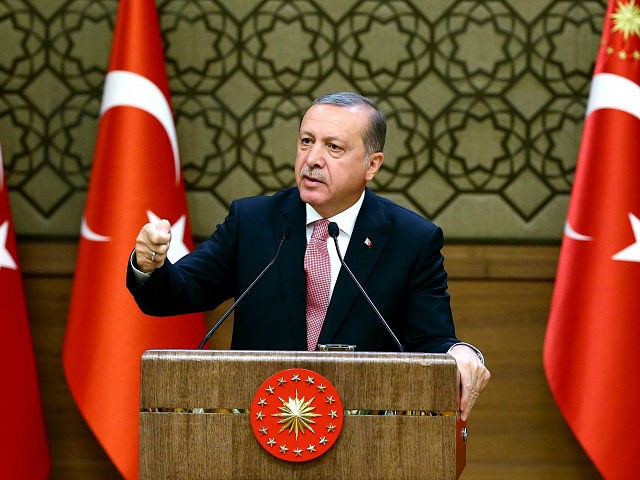Turkish President Recep Tayyip Erdogan has given multiple speeches in the past week, admitting to having been an ally of Fethullah Gulen, an Islamic cleric Erdogan claims staged the failed coup attempt against him last month, because of Islam.
“I personally helped this structure despite differences of opinion on many issues due to a belief that we can agree at least on common denominators,” Erdogan told a crowd Wednesday, adding, “we tolerated them because they said ‘Allah.'” He cited multiple former Turkish presidents and prime ministers as having supported Gulen themselves for the same reason.
In a speech earlier this week, Erdogan made similar remarks. “We made serious mistakes,” he said on Monday. “May Allah forgive us!”
Open claims of having supported Gulen, who runs a chain of Islamic charter schools in the United States, are part of Erdogan’s campaign to rally opposition to Gulen. Erdogan’s government alleges that the failed coup attempt against him earlier this month was planned by Gulen supporters within the military. However, Erdogan has not made any evidence pointing to Gulen public, arousing suspicions that Gulen was not the culprit and conspiracy theories that Erdogan may have planned the coup himself as a way to consolidate power.
The Turkish government has repeatedly accused Gulen of running an international Islamist cult dedicated to creating a “parallel” society within Turkey, using teachers, businessmen, and infiltrated soldiers to topple the president. Erdogan himself is the head of the Islamist Justice and Development Party (AKP), though its members oppose Gulen as a cult leader and not a proper Islamic cleric.
Gulen has denied all accusations and claims to have had nothing to do with the coup attempt.
On Thursday, Erdogan was again on the stump against Gulen, urging Turkish business leaders to purge their companies of any employees suspected of being Gulenists. The Turkish government will seek to freeze the assets of corporations run by suspected Gulenists.
Also on Thursday, a Turkish court issued a formal warrant against Fethullah Gulen himself. The Turkish government has twice asked the United States to extradite Gulen, which U.S. officials have said is a request they will consider. America has not yet agreed to extradite him, however, requesting more evidence of his ties to the coup.
Erdogan has called it a “big mistake” for Washington not to comply with the extradition request, as well as accused the European Union and the “West” generally of “supporting terrorism” by expressing concern over major human rights abuses reportedly committed by Erdogan’s government.
The Turkish government claims that many of those arrested during the coup attempt have confessed to being supporters of Gulen, though Amnesty International has found evidence that Turkish officials tortured and raped many of those in their custody following the coup, which could cloud the veracity of those confessions.
Over 60,000 people have been arrested or placed under investigation in the aftermath of the coup, according to the pro-Erdogan Turkish newspaper Sabah.
U.S. Secretary of State John Kerry will make a visit to Turkey before the end of August, the first such visit since the coup attempt and one observers believe will involve much discussion on Gulen’s ties to the coup attempt as well as extradition requests.

COMMENTS
Please let us know if you're having issues with commenting.